Elegant Home Design and Decor: 15 Ideas to Implement
The foundation of an elegant home delves beyond affluence or possessing the home of your dreams with multiple specialty theme rooms, such as a private cinema or other media rooms. Instead, incorporate a refined design theme to your home, and next add sophisticated touches to help create a polished living environment.
Elegance is rooted in deliberation in that it is well thought-out without being overdone. Each component is chosen for a reason and flows cohesively relative to its environment. Incorporate the following tips into your elegant home improvement, thereby ensuring your home appears beautiful and cosy, yet visually well-thought out.
Functional Use of Space
Elegant home storage
The essence of an elegant home lies in maintaining a tidy and uncluttered environment. No matter how lavish the furniture or exquisite the décor, true elegance is lost in a home overwhelmed by disorder and clutter.
Ottomans and Entryways
To create a refined atmosphere, embrace a minimalist approach. Ensure that each item in your home has a designated place and serves its purpose. Items not in use should be neatly stored away. For instance, place an elegant storage ottoman by the entryway as a great way to keep frequently worn shoes out of sight. Consider the A.R.T Blissany Cedar Lined Storage Bench as a great elegant option.
This level of organisation serves a practical function; moreover, it also enhances the aesthetic appeal of your spaces. An organised home not only makes it easy to find what you need, but also allows the eye to appreciate the clean, harmonious surroundings. Adopt this approach to enable your home to be poised to welcome visitors.
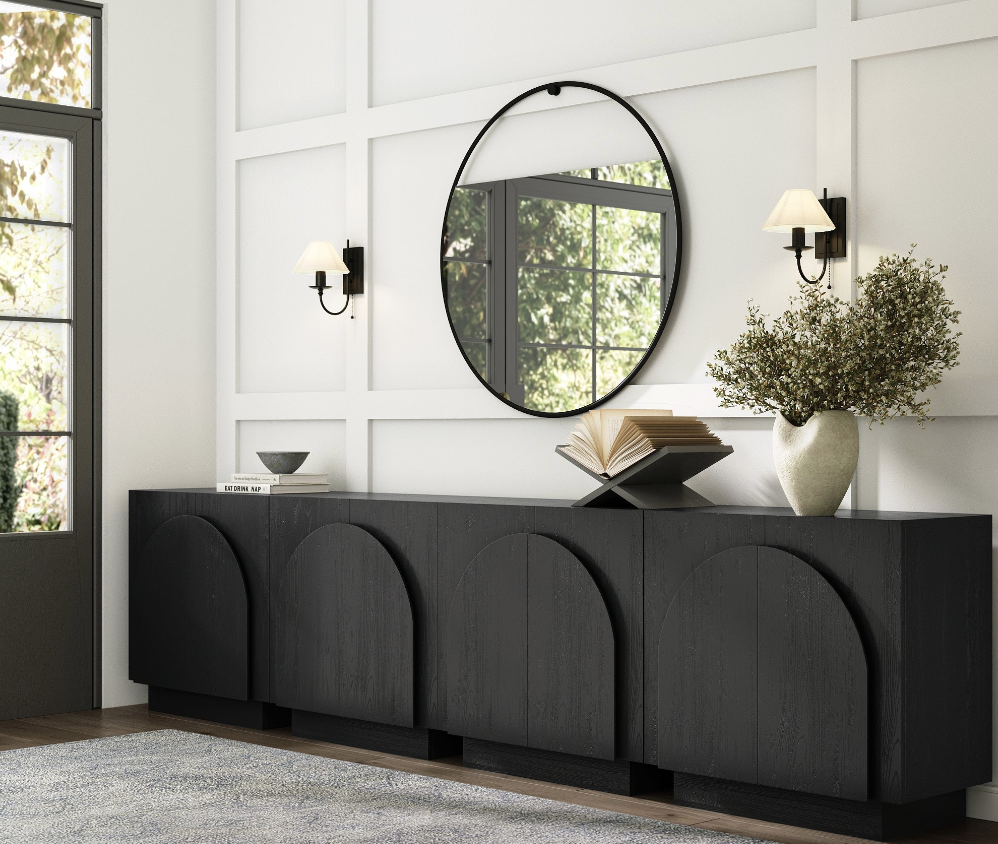
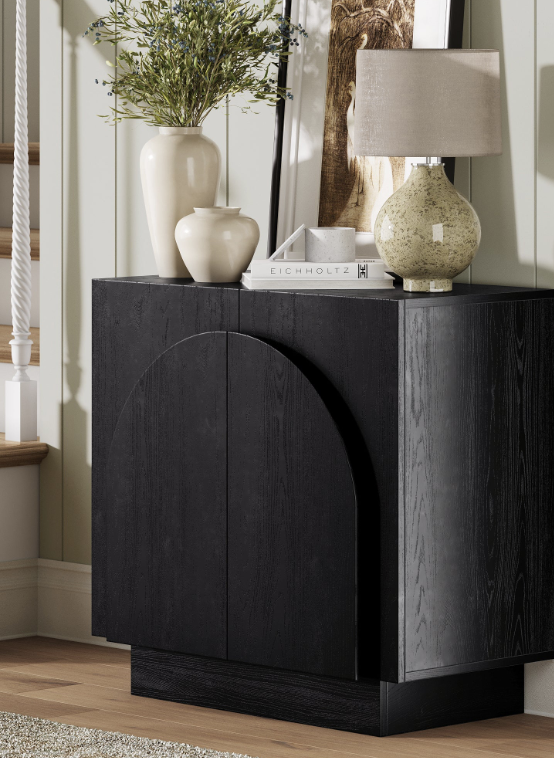
Designing an elegant, open floor plan
To create an elegant and luxurious interior within an open floor plan, strategically place furniture to define distinct zones for different activities. Incorporate elegant room dividers like open shelving, or positioning a sofa or rug to establish a cozy living area and visually divide these distinct areas while preserving the sense of openness.
Next, focus on incorporating statement pieces to elevate each zone. A well-chosen chandelier, a striking art piece, or a unique coffee table can serve as focal points, adding character and sophistication. By seamlessly integrating these elements, you create a harmonious and inviting environment that exudes refinement.
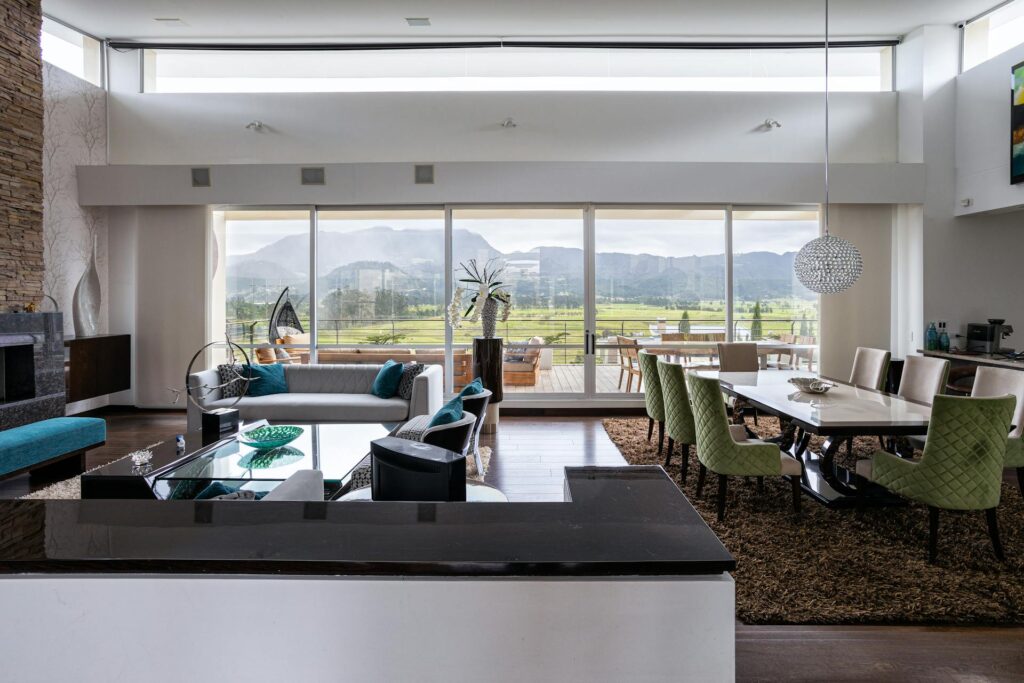
Select and implement a consistent colour palette for an elegant home
The 60-30-10 rule
To enhance an elegant home, establish a cohesive colour palette that aligns with your interior design style. Utilise the 60-30-10 rule to create balance:
- allocate 60% of the space to a dominant colour;
- 30% to a complementary secondary colour or texture, and;
- 10% to an accent hue for visual interest.
60-30-10 Rule Example
For instance, in a living room, you might use a rich mahogany for walls and flooring (60%). Next, use deep burgundy velvet chairs in the open plan dining room (30%), and a crystal chandelier or gold accents (10%). This approach ensures a refined and visually captivating effect through the thoughtful interplay of colour, tone, and texture.
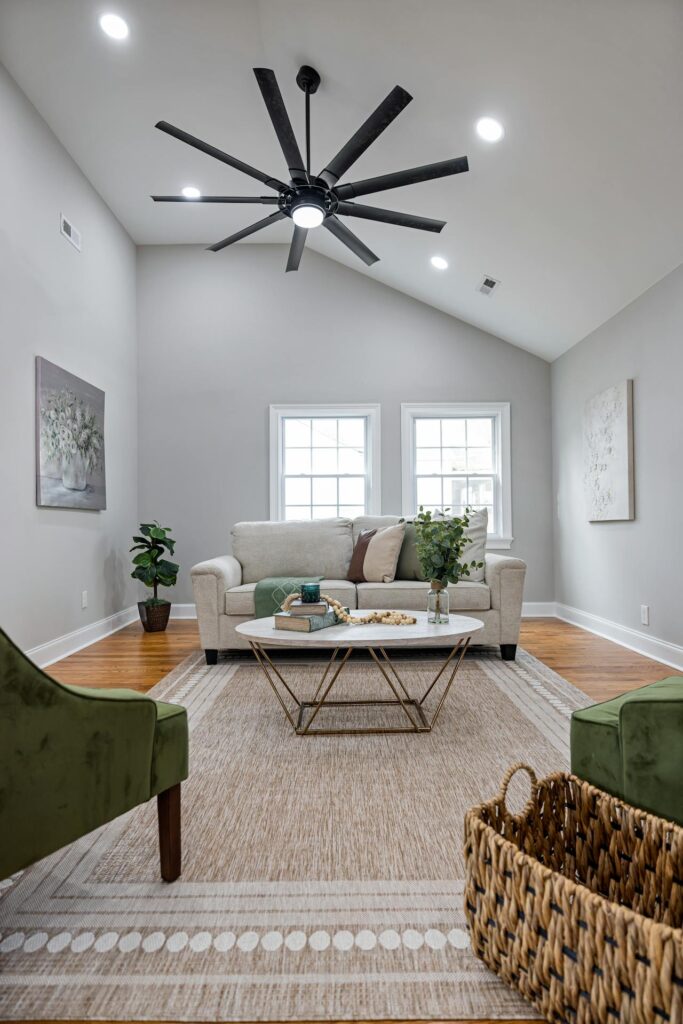
Consistent luxurious interior design style
To elevate your home with a cohesive and elegant interior design, begin by selecting a style that aligns with your budget and personal taste. Consider taking inspiration from various design periods, and remember that mixing styles can be effective when applied consistently throughout your home.
Traditional (pre-20th century) interior design styles
Traditional interior design styles encompass classic and timeless aesthetics with ornate details, rich colours, and luxurious fabrics. Their often formal interior draws inspiration from historical periods and emphasise elegance, sophistication, and a sense of opulence.
French Provincial style
French Provincial, in contrast to older, more ostentatious interior design styles such as Hollywood Regency and Victorian, blends simplicity with refinement for more understated elegance.
This style draws inspiration from the French countryside with its warm ambience, natural materials, and curvaceous furniture. The emphasis is on natural beauty and delicate accents without excessive grandeur.
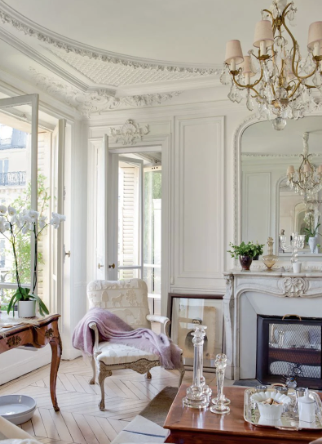
Georgian style
Conversely, Georgian style holds a sense or grandeur and airiness. It emphasises classical elements like symmetrical layouts, high ceilings, large windows and grand fireplaces, or a beautiful chandelier.
Columns with a muted colour palette took centre stage to highlight the craftsmanship of architectural details and quality materials such as mahogany and walnut. Georgian design originated in the 18th century during the reigns of the British monarchs George I to George IV.
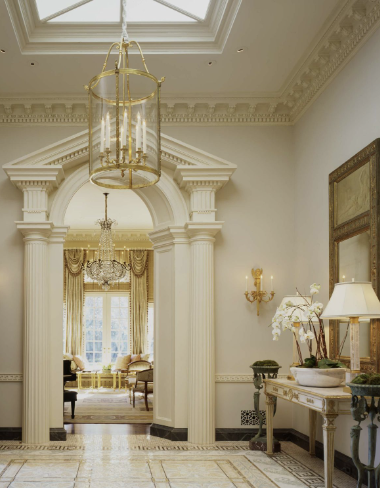
Modernism (20th to mid-20th century) interior design styles
If you prefer a more streamlined yet functional aesthetic, consider modernist styles like Art Deco or Mid-Century Modern.
These modernist styles emerged in the early 20th century as a rejection of traditionalism, namely the maximalism of the Victorian mindset. This new era ignited a fusion of modernist simplicity with opulent detailing and luxurious materials.
Art Deco style
Art Deco emerged in the 1920s and 1930s during the interwar period, drawing inspiration from avant-garde 20th century art movements. This style balances modernist influences with lavish flourishes. Modern elements included mirrored surfaces, lacquered woods and plush textiles. Traditional opulence was embodied in stylised motifs and ornate elements.
Art Deco style interestingly represented a departure from the organic forms of Art Nouveau, the functionalism of modernism, and the industrial focus of Art Moderne.
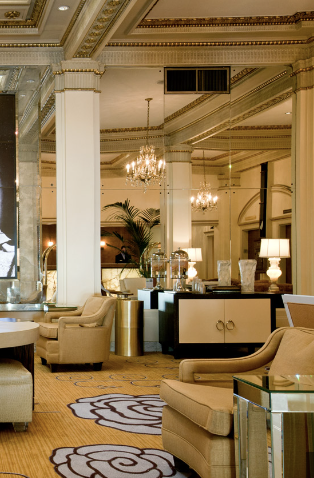
Mid-Century Modern style
Mid-Century Modern, with its sleek furniture embraced a “less is more” philosophy following the post-war era from the 1940s to 1960s. It focused on geometric and organic shapes, and integration of art and technology. Two notable designs from this period include the Egg Chair by Arne Jacobsen and the Tulip Table by Eero Saarinen.
Mid-century modern design has experienced a resurgence in popularity in contemporary times. Its clean lines, timeless appeal, and focus on functionality continue embody a classic yet modern aesthetic.
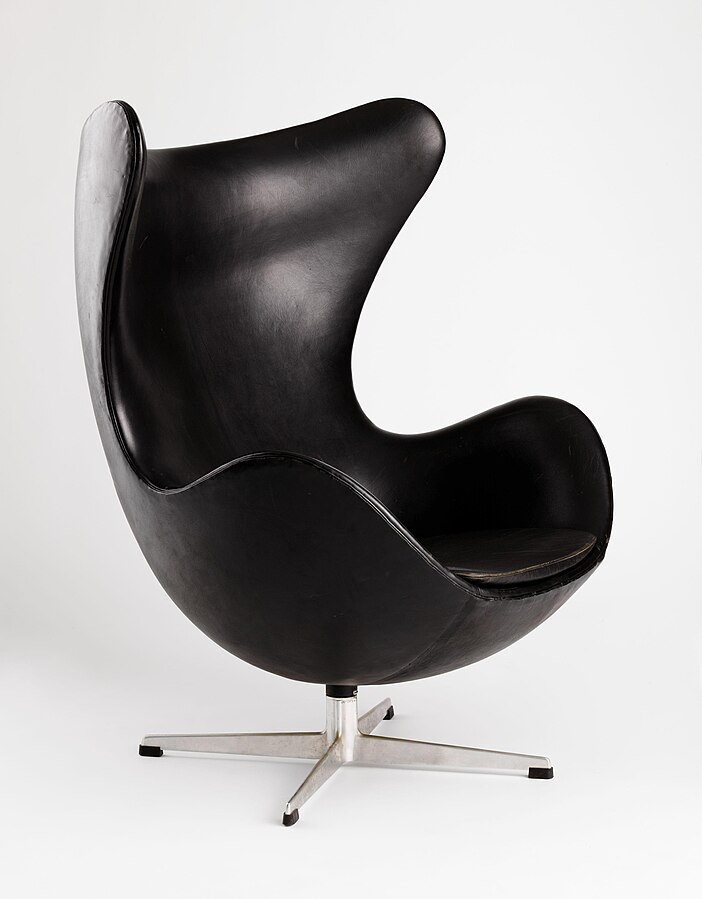
Post-Modernism (late-20th century) interior design styles
Transitional style
For those seeking a blend of traditional and modern elements, the Transitional style from the 1950s combines classic warmth with contemporary simplicity, using a mix of materials for a layered look.
The Transitional design style arose in the post-modernism era in the late 20th century. This era rejected rigidity of former styles and embraced eclecticism, irony, and a playful approach to design. It showcased unconventional shapes and a juxtaposition of materials like wood, metal, glass, and stone. This offered a more diverse and layered look than more simplistic styles of minimalism.
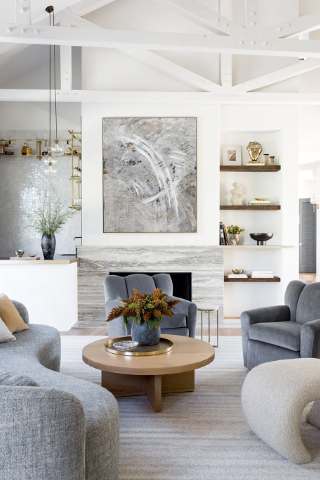
Contemporary (present day) interior design style
Contemporary Minimalism style
Alternatively, Contemporary Minimalism emerged as a response to the excesses of the post-modern era. It focuses on clean lines, open spaces, and high-quality materials. You can achieve elegance through simplicity, comfort and functionality. Choose a mixture of minimal, sleek furniture in an open floor plan with a neutral colour palette, curated décor and artwork. High-quality materials like natural wood, stone, and metals add a touch of luxury.
A popular choice today, Scandinavian design is renowned for its light and airy approach to create a serene environment. Scandinavian design often features light oak or birch wood, complemented by minimalist pendant lights or wall sconces made of brushed metal or glass.
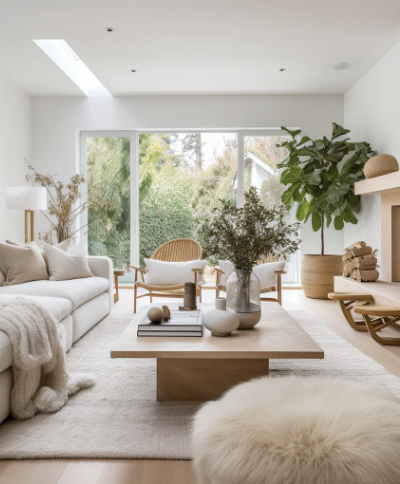
Prioritise quality, natural materials
Elegant home high-grade materials
To create an elegant home, be selective with your fabric choices, as the quality of materials greatly influences the overall aesthetic. This principle is crucial when a material covers a larger area whereby its quality will stand out.
Natural materials like genuine full-grain leather exude luxury and durability, making them superior to low-grade synthetics. The cost of natural materials often reflects their quality, durability, and the skilled craftsmanship involved in their higher costs of production, which adds a luxurious appeal to your space.
Avoid compensating on material quality
Exercise caution with cheap imitations, such as faux marble. Synthetic marble furniture lacks the unique veining and colour variations found in the mineral composition of genuine marble. Real, high-quality marble is formed over millions of years in the metamorphic process and therefore cannot be easily replicated.
Budget for at least mid-range quality, even if it necessitates additional time, financial planning, and effort. This will ensure that your home maintains an elegant and authentic feel, as true quality is evident in the details.
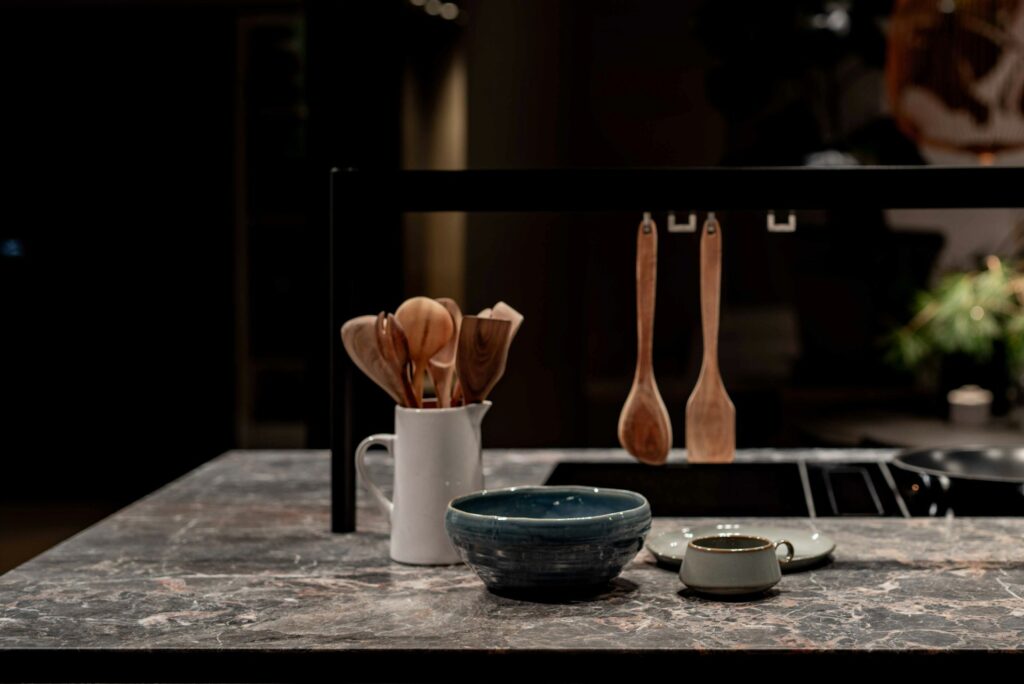
Opt for durable, high-quality options
Choose durable materials like tempered glass, stainless steel, or high-quality hardwoods such as oak for long-lasting elegance. While exotic woods like mahogany or walnut add a luxurious touch, more affordable options can still offer longevity and maintain a refined look. Prioritise materials that balance quality and durability to elevate your home’s interior.
For a truly refined touch, consider integrating luxury bathroom accessories like these 16 ideas made from high-quality materials, such as marble or polished metals, to enhance the elegance of your space.
Elegant Home Essentials: Luxury Cotton Bedding
Hotel-grade cotton bedding
For a truly luxurious bedding experience that mirrors the opulence of high-end hotels, opt for bed sheets crafted from 100% long-staple Egyptian cotton with a thread count between 300 and 600.
The extended length of Egyptian cotton fibres is attributed to the hot, arid climate of the Nile River Valley, where the cotton is handpicked. These long fibres result in fewer breakages during the weaving process, creating smoother, more resilient sheets that only improve with each wash. Egyptian cotton’s fine, strong threads are particularly prized for their luxurious feel and breathability, making it an ideal choice for an elegant home.
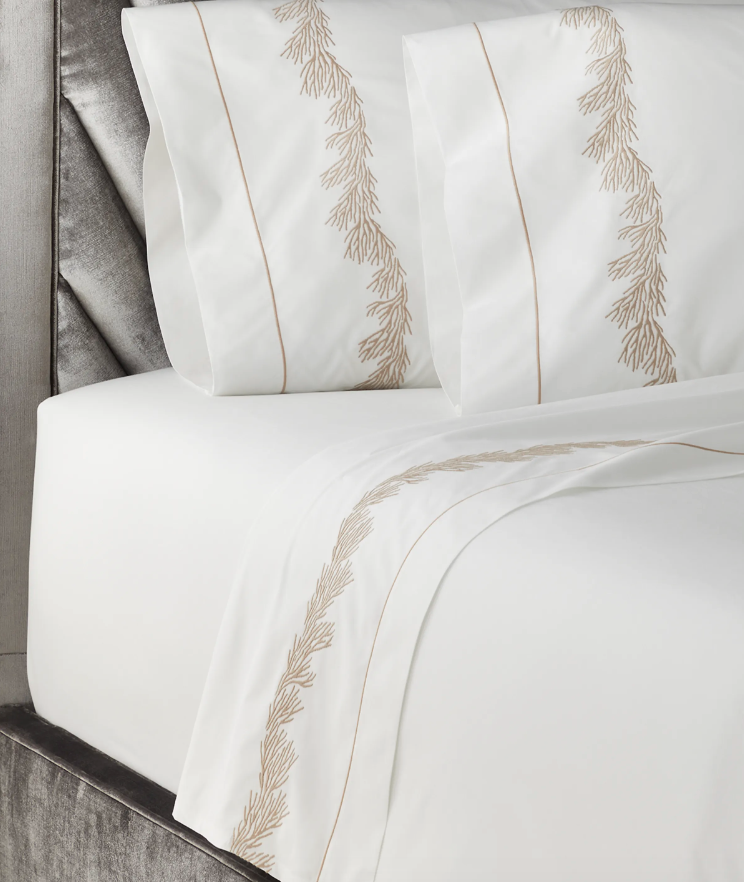
Atoll 520-Thread-Count Cotton Bedsheets
Consider Matouk, a niche brand known for its meticulously crafted Egyptian cotton sheets that epitomise understated luxury and comfort. Founded in 1929 by John Matouk after studying fine fabrics in Italy, Matouk has become a renowned source for fine bed and bath linens.
The third generation of the Matouk family now leads the company. They are continuing its legacy of uncompromising quality and hand-finished detailing by skilled craftsmen.
- Made from cotton percale;
- Crisp 520-thread-count.
Elegant Home Touches: Long-Staple Luxury Cotton Towels
Egyptian cotton or supima cotton towels
In addition to luxurious bedding, elevate your elegant home with towels made from premium long-staple cotton, such as Egyptian or Supima cotton. These fibers, known for their softness and durability, create smoother, more tightly woven fabrics. Supima cotton, grown in the United States, offers similar benefits, with fiber lengths ranging from 1.5 to 2 inches.
Both Egyptian and Supima cotton towels are renowned for their ability to improve with each wash, like the No-Odour Supima towels from the Nutrl Home by Ravel Classic Bath Towel Set. The towels become even softer over time whilst maintaining their plush texture. By incorporating these high-quality textiles into your home, you ensure a refined, luxurious experience in every detail.
Luxury Rugs and Upholstery
Finally, luxury rugs and upholstery can further enhance your elegant home. High-quality rugs, such as those made from. a resilient wool or sof silk, and well-crafted upholstery in natural fabrics like leather or velvet, add a sophisticated touch.
Infuse Biophilia Into Your Elegant Home
Incorporate biophilic design into your elegant home to reconnect with nature and enhance tranquility. Humans are intrinsically biophilic beings who naturally find solace in living entities, such as pets and plants, which can create a serene and refined environment. Their presence can elicit the release of cytokines in the brain, which induces the production of serotonin, a neurotransmitter known for its mood-enhancing properties.
Choose statement plants
Select striking plants, like a floor-to-ceiling birds of paradise or a majestic fiddle-leaf fig, to serve as an accent piece. Note that most require a well-lit area with enough direct and indirect sunlight.
For added sophistication, consider the Kentia palm. This plant evokes the opulence of Edwardian palm courts and brings a touch of historical elegance to your space.
Enhance with floral elements
Further elevate your home’s ambiance with fresh flowers or potted orchids, or opt for low-maintenance dried arrangements, or pampas grass.
While initial costs may be higher, these options provide long-lasting beauty. A dried flower arrangement may last for up to two years. This means they can effortlessly bring long-lasting glamour to your elegant home.
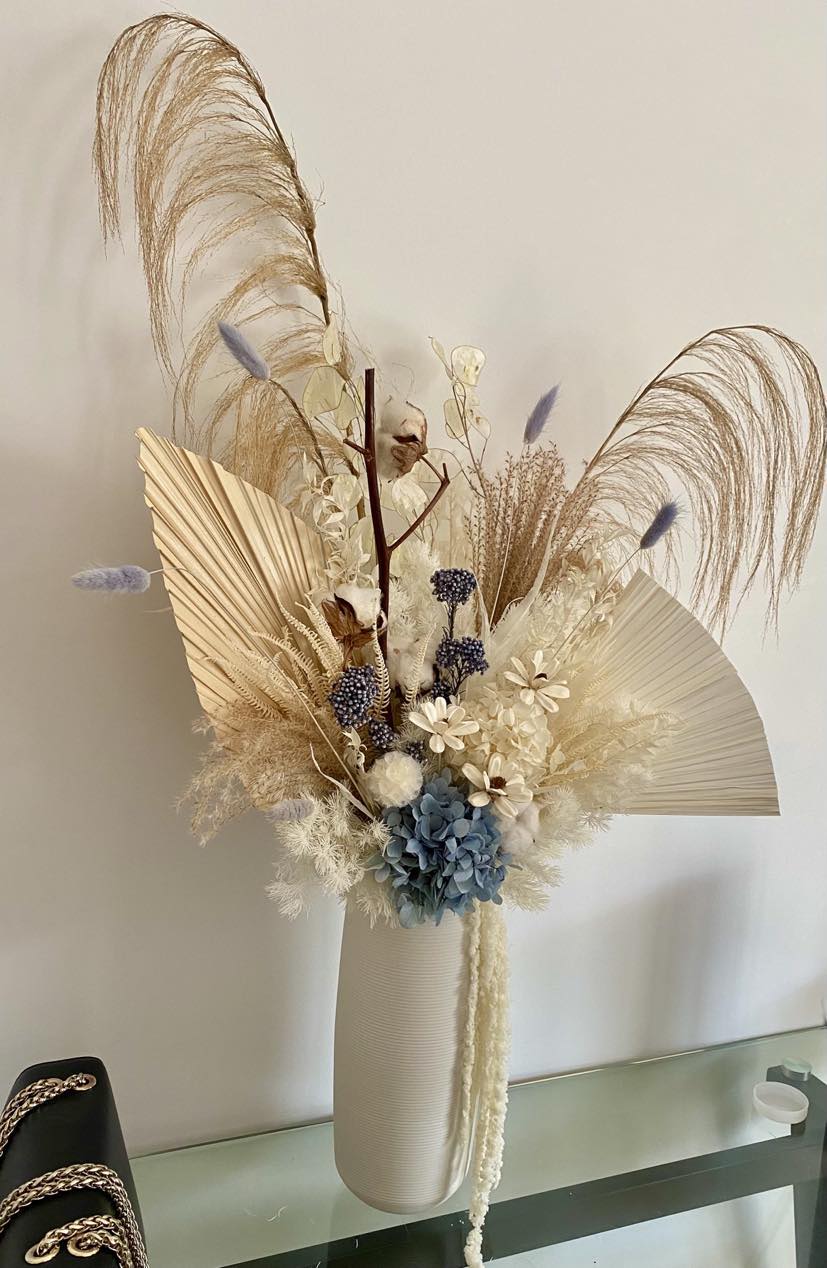
Elevate your Elegant Area with High-Quality Wall Décor
Luxurious wall art decor enhances the ambiance of an elegant home, imbuing it with uniqueness and opulence. Select pieces that complement your colour palette and overall interior design for a cohesive look.
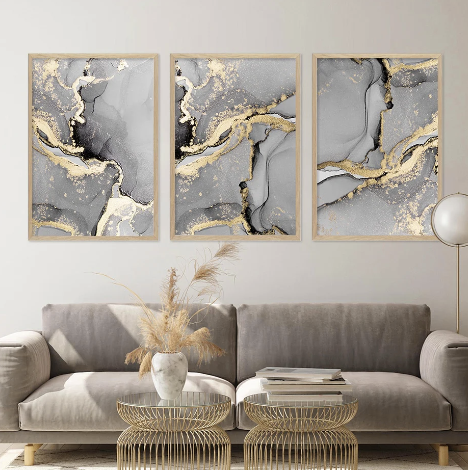
Elegant wall art options
Consider art-deco inspired poster-style prints, or 19th-century botanical and zoological prints, such as ‘type specimen’ illustrations. The latter originates from hand-drawn depictions that capture how a species should appear.
Additionally, marble wall art offers contemporary sophistication, echoing the prestige of historical marble while adding depth to modern interiors.
Achieve visual balance
Ensure art is correctly sized and positioned for visual balance. Use large statement pieces or carefully curated smaller selections to create harmony. Align artwork at eye level and maintain 2 to 3 inches of space between pieces, as recommended by interior designer Emily Henderson, to achieve a refined and balanced display. For statement pieces, ensure equal spacing around the artwork to enhance its impact within the space.
Master the Art of Strategic Lighting and Accent Illumination
Lighting can transform an elegant home, creating a resplendent atmosphere by balancing light and shadow. Light creates the illusion of expansiveness by highlighting depth and height, adding a sense of grandeur.
Lighting temperature and types
Use warm light (3000 Kelvins or lower) for a cozy and inviting glow. Incorporate no more than three types of lighting fixtures in a space. For example, a floor lamp, a table lamp, and candles can collectively illuminate a living area.
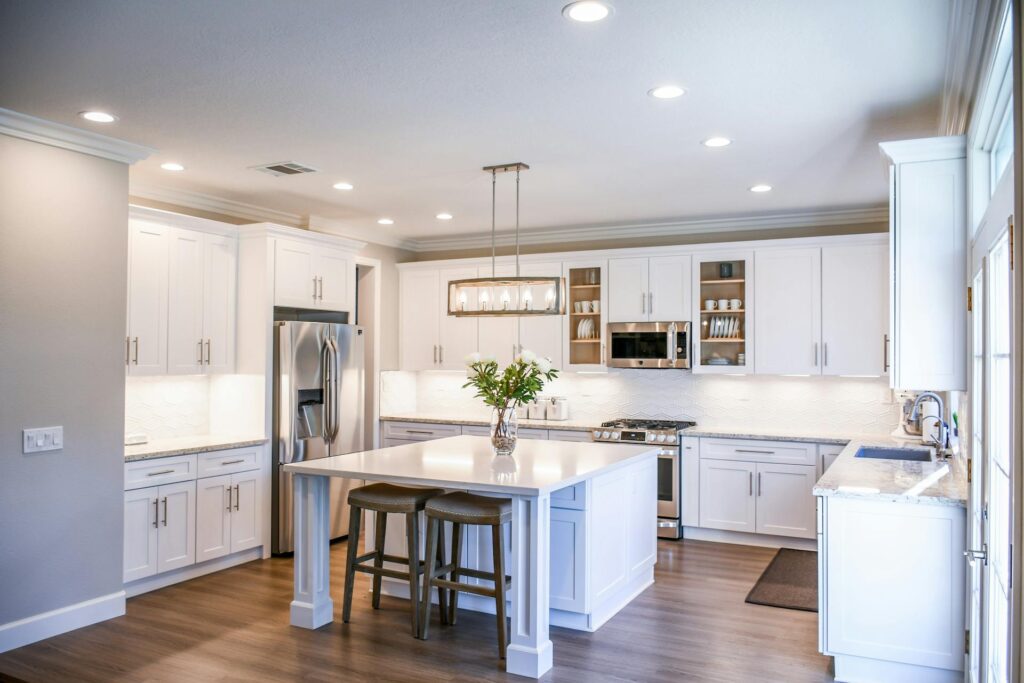
Accent Lighting and Fixture Selection Tips
- Employ accent lighting to highlight focal points, such as illuminating a painting with wall lights to add depth.
- Use ceiling lights that, when used strategically instead of a single harsh overhead light, create a soft, ambient glow that enhances the warmth and sophistication of an elegant home.
- Under-counter lighting adds subtle, functional illumination that accentuates the room’s details without overpowering the space.
- Choose lighting styles that complement your interior design: mid-century fixtures with clean lines fit various aesthetics, while industrial lighting with metallic elements and rugged design adds a touch of raw authenticity.
Maintain a Clean and Pleasant-Scented Elegant Home
A tidy environment enhances clarity and contentment, making regular cleaning essential. Dedicate time each week to tidy surfaces and declutter to create a safe and serene space with peace of mind. Avoid letting clutter accumulate by regularly donating items you no longer need.
Scents and ambience of an elegant home
Invest in mildly scented candles or diffusers to infuse your home with pleasing aromas for a fresh update. This is particularly crucial in areas prone to odours like the kitchen or where pets reside. Pleasant scents are crucial, as even the finest furnishings cannot mask unpleasant odours. Cultivating a home with inviting aromas will elevate its elegance and comfort.
Consider a luxury diffuser from Jo Malone London, a niche brand renowned for its unique ability to blend high-quality ingredients into complex, layered scents that evolve over time. These diffusers infuse an elegant home with a refined, enduring fragrance that adds a touch of sophistication and serenity to any room.
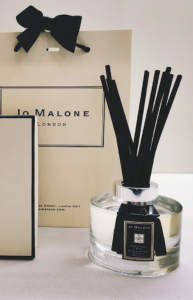
Furthermore, incorporate luxury hand soap into your cleaning routine to ensure your home’s aroma remains fresh and inviting, aligning with your commitment to an elegant and pleasant environment.
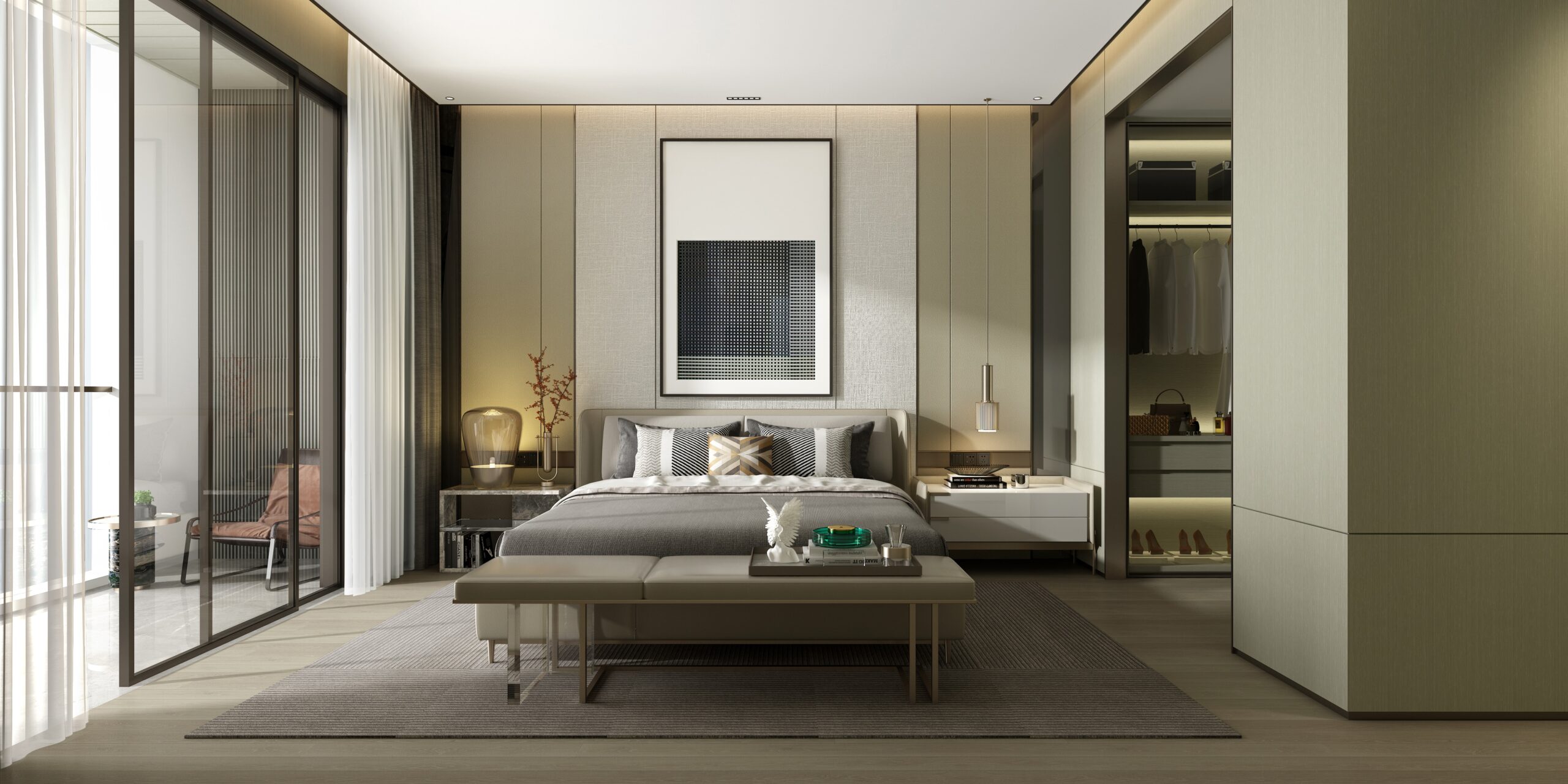
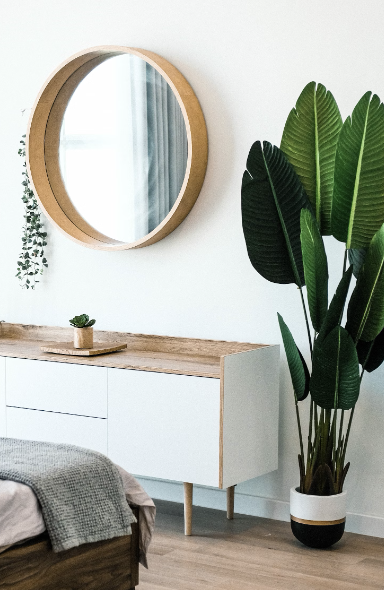
Leave A Comment